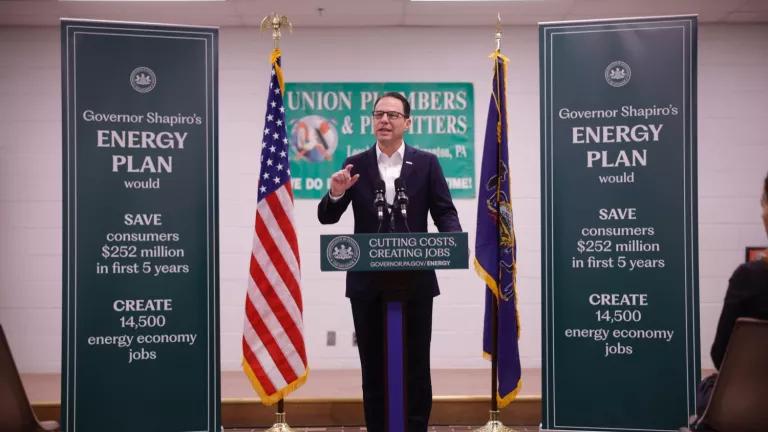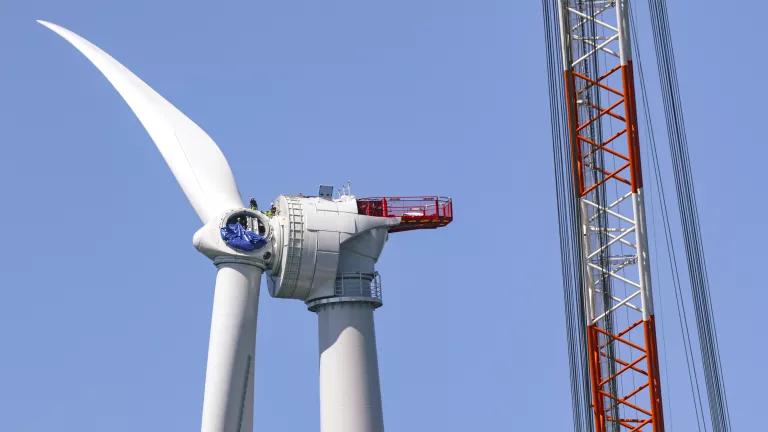Historic New Commitment to Slash Southeast Carbon Pollution

For too long, the Southeast has lagged behind the rest of the nation on commitments to cut carbon pollution and build the clean energy economy. According to Southern Company CEO Tom Fanning, that’s about to change. Today, Fanning made a shareholder commitment that the Southern Company: one of the nation’s largest utilities, which for decades was one of America’s largest emitters of carbon pollution and a frequent foe of environmental protections, will by 2050 reduce the net carbon emissions from its electric and natural gas operations to . . . ZERO.
Southern Company serves 9 million customers in the Southeast and though it is not the first utility to make such a net-zero-emissions commitment, it had already begun a shift toward cleaner energy sources while recording significant reductions in carbon pollution over the past decade. And while we will wait and see whether the pace to decarbonize accelerates, Fanning’s announcement to shareholders confirms that the case for eliminating climate-warming carbon pollution cannot be denied. It is embraced across the full spectrum of U.S. utility leadership in all of the nation’s regions. And we hope that consensus marks a beginning of the end to ideological and partisan discord over these issues.
There is a lot to unpack with this announcement, and there isn’t a lot of detail yet, but Southern’s new commitments to renewables and energy efficiency hold great potential to speed the transition to a clean energy economy. The announcement also envisions adding negative carbon solutions. These include established approaches like afforestation (expanding forests to capture carbon) but also new technologies like direct air capture of carbon, which is much more experimental and for which the devil will be in the details. Today’s announcement mentions biomass (which is rarely carbon neutral and has its downsides) with carbon capture and sequestration as an option too, but we hope Southern will reconsider that particular approach. Fanning emphasized that getting to zero-net emissions is good business strategy—(in fact, he called it a “no-brainer”)—joining with many other utilities on why it makes sense to transition to a clean energy economy.
NRDC will be watching closely and working hard to ensure Southern meets its 30-year goal at least cost, in the cleanest and most equitable manner—and even faster. But next time a politician or a regulator or a neighbor says that humanity can’t stop a suicidal experiment with climate change, it may be helpful to say that the Southern Company begs to differ, and aims to prove it in the Southeast, where it serves electric customers in Alabama, Georgia, and Mississippi, and gas customers in Georgia, Virginia, Tennessee, and Illinois.
The back story
How did this announcement come about? It is likely that many factors contributed. The risks from climate change are increasingly evident and Southern’s leadership has recognized this is a problem the company cannot ignore. Southern also has a corps of engineers interested in helping to develop and implement the solutions needed to decarbonize, and the company has even instituted an internal X-Prize-like competition for best actionable solutions.
For several years, Southern has engaged in serious conversations with a range of stakeholders who wanted the company to be a climate leader. A yearly two-day meeting, instituted by CEO Tom Fanning, allowed direct discussions of environmental issues between senior company officials (including Fanning) and key stakeholders. While the topics vary greatly, climate has figured prominently every year as stakeholders and company officials shared information and identified common ground. NRDC has been an important part of this conversation, with many colleagues joining the two of us in an extended engagement with Southern Company leadership, marked at times by fierce environmental policy disagreements.
Important additional influences have been Sister Barbara Aires, Sister Pat Daly, and their Interfaith Center on Corporate Responsibility (ICCR) colleagues, and indefatigable Georgia-based environmentalist Sam Collier, who reports that Southern’s leadership team ventured regularly to Sister Barbara’s New Jersey convent to discuss decarbonization.
Progress in the Southeast
For all involved, and many allies, Southern Company’s announcement also needs to be understood in the broader context of progress on climate and clean energy in the Southeast. In North Carolina, clean energy jobs now account for over half of the state’s energy sector jobs, and the solar industry has grown exponentially over the last decade to make it the Southeast’s leader (and second in the United States) in installed solar capacity. In fact, solar installations have expanded in the Southeast nearly thirty-fold in the last seven years, and Georgia is one of the country’s fastest-growing solar markets. Duke Energy, another large utility in the region, has also committed to carbon neutrality by 2050 for its electric business. Virginia has committed to an emissions-free power sector by 2050, and Dominion Energy has pivoted away from gas and toward renewables, although more work is needed to tap the large potential for cost-saving energy efficiency.
The region is changing quickly to meet the climate crisis and the clean energy transition is well underway. However, there is much unfinished business that requires immediate attention from Southern and others. We will work hard to make sure these regional commitments are met in the most environmental and equitable manner possible. Priorities include:
- Investing in clean, efficient, and affordable alternatives—like energy efficiency, demand response, and renewable energy—rather than gas-fired power plants wherever possible. The potential for savings from energy efficiency in the Southeast is vast and largely untapped, and should form the lion’s share of new investments in addition to emerging flexible technologies like storage.
- Ensuring that equity and affordability are at the heart of this clean energy transition, paying particular attention to how the costs of Southern’s nuclear fleet buildout at Plant Vogtle Units 3 and 4 under construction in Georgia are addressed and that customers are protected.
- Evaluating the need for, and alternatives to, new investments in local gas distribution infrastructure. A different approach is needed to system planning where clean, non-pipeline investments like efficiency, electric heating and cooling systems, and other cost-effective solutions that can help reduce the need to build new, or replace aging gas infrastructure are the rule, not the exception.

Finally, Southern’s announcement is one more reminder of the role utilities can and should play in accelerating America’s clean energy transition, with all of the accompanying health, equity, reliability, and affordability benefits. Utilities can enable cities and states to meet their climate commitments, like Georgia Power through its Customer Renewable Supply Procurement program. NRDC’s Annual Energy Report and our Race to 100% Clean interactive story map provide abundant evidence of clean energy gains already achieved, along with the promise of much more to come. This industry consensus should spur policymakers to act on a set of strong and ambitious climate policies to propel us on the path toward limiting the worst impacts of climate change while creating jobs and growing the economy in the Southeast and nationwide.





